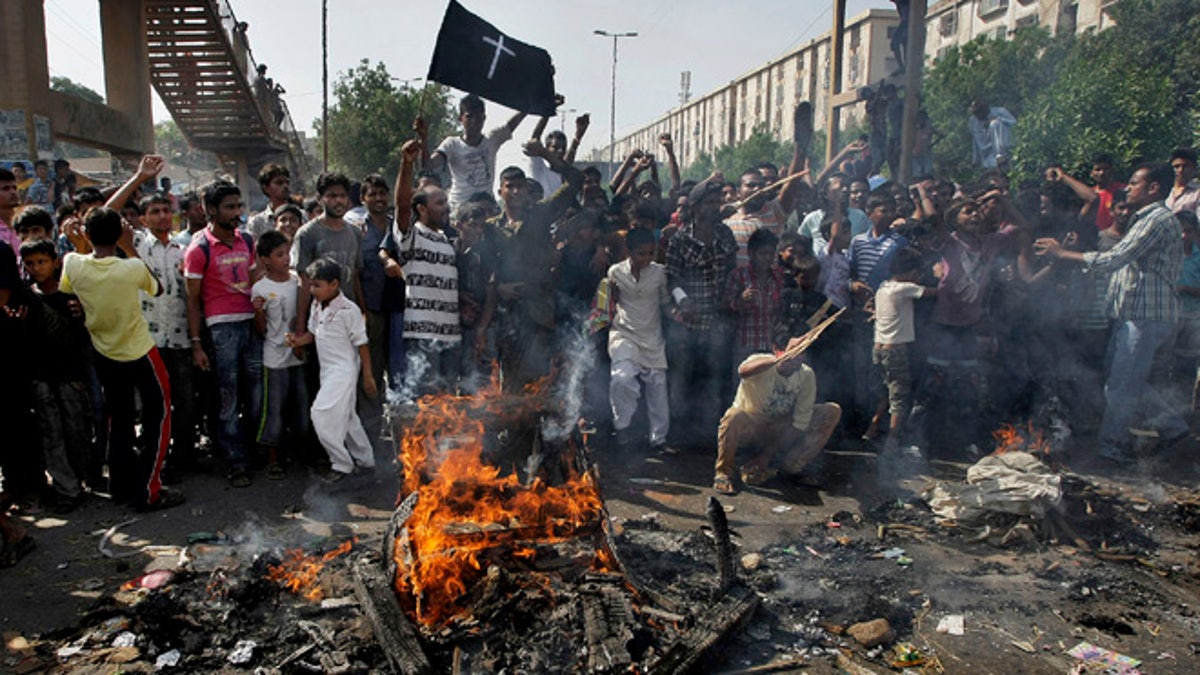
Sept. 22, 2013: Pakistani Christians chant slogans as they burn materials during a protest against a suicide attack on a church in Karachi, Pakistan. A suicide bomb attack on a historic church in northwestern Pakistan killed scores of people Sunday, officials said, in one of the worst assaults on the countrys Christian minority in years. (AP)
PESHAWAR, Pakistan – Angry Pakistani Christians on Monday denounced the deadliest attack ever in this country against members of their faith as the death toll from the church bombings the day before climbed to 85.
A pair of suicide bombers blew themselves up amid hundreds of worshippers outside a historic church in northwestern Pakistan on Sunday.
The attack on the All Saints Church in the city of Peshawar, which also wounded over 140 people, occurred as worshippers were leaving after service to get a free meal of rice offered on the front lawn.
A wing of the Pakistani Taliban quickly claimed responsibility for the bombings, saying they would continue to target non-Muslims until the U.S. stops drone attacks in the remote tribal region of Pakistan.
The bombings raised new questions about the Pakistani government's push to strike a peace deal with the militants to end a decade-long insurgency that has killed thousands of people.
"What dialogue are we talking about? Peace with those who are killing innocent people," asked the head of the All Pakistan Minorities Alliance, Paul Bhatti, whose brother, a federal minister, was gunned down by an Islamic extremist in 2011.
"They don't want dialogue," said Bhatti. "They don't want peace."
The death toll on Monday climbed to 85, after seven more of the wounded in Peshawar died overnight and Monday, according to the commissioner of Peshawar, Sahibzada Anees.
"Our state and our intelligence agencies are so weak that anybody can kill anyone anytime. It is a shame," said Bhatti.
Angry Christians blocked roads around the country to protest the bombings. On one of the main roads coming into the capital of Islamabad, demonstrators burned tires and demanded government protection for the members of the Christian minority.
"Our people have been killed ... Nobody seems to bother about us. No one apprehended the killers," said Aqeel Masih, one of the protesters. He added that he fears Pakistanis will simply forget about the bloodshed in a few days.
In the southern port city of Karachi, a few hundred demonstrators chanted "Stop killing Christians!" and demanded that those who attacked their community be held accountable.
"We want an end to extremism, terrorism and barbarianism in Pakistan," said Bashir John, a priest.
Missionary schools around the country would be closed for three days, said Christian leader Nasir Gill. He said 68 bodies of Peshawar victims were buried Sunday and the rest would be buried today.
Churches and other places important to the Christian community in Peshawar have been given extra security, said police official Noor Khan.
But this has not been sufficient to appease angry Christians in Pakistan, who want the government to take even stronger steps to protect them.
Many churches, as well as mosques and other religious institutions, already receive some type of police protection although many Christians say that is too little. A police officer who was supposed to be protecting the church where the suicide bombers attacked was killed.
Christians are a minority in Pakistan, where roughly 96 percent of the country's 180 million people is Muslim. The rest belong to other religions, including Christianity. Christians have often been attacked by Sunni Muslim militants, who view them as enemies of Islam because of their faith.
While many Pakistanis condemned the Sunday bombings, Christians have often faced discrimination across the country. They often find it difficult to get access to education or better jobs and are known for having to contend with menial labor such as garbage collecting or street cleaning.
Also Monday, a bomb exploded near a police patrol in southwestern Baluchistan province, killing four people, including three policemen, said police officer Abdullah Khan. The bombing occurred in Pashin district, some 45 miles north of the provincial capital, Quetta, said Khan.
No one has claimed responsibility for the attack. Baluchistan is home to both Islamic militants and nationalists who have been fighting an insurgency against the government for decades for a greater share of the province's natural resources.
